| SHADOWS ON THE WALL | REVIEWS | NEWS | FESTIVAL | AWARDS | Q&A | ABOUT | TALKBACK | |||||
 Shadows off the beaten path Shadows off the beaten pathIndies, foreign, docs and shorts...
On this page:
THE DISSIDENT |
MLK/FBI |
ZAPPA
| |||||
| See also: SHADOWS FILM FESTIVAL | Last update 14.Jan.21 | |||||
|
The Dissident Review by Rich Cline | 
| |||||
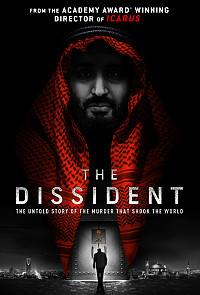 dir Bryan Fogel scr Mark Monroe, Bryan Fogel prd Bryan Fogel, Jake Swantk, Mark Monroeo, Thor Halvorssen with Jamal Khashoggi, Hatice Cengiz, Omar Abdulaziz Alzahrani, Iyad El-Baghdadi, Wadah Khanfar, Fred Ryan, David Ignatius, Shane Harris, Irfan Fidan, John Brennan, Anthony J Ferrante, John Scott-Railton release US 25.Dec.20, UK 5.Mar.21 20/US 1h59 SUNDANCE FILM FEST Now streaming...
|  The state-sanctioned murder of journalist Jamal Khashoggi on foreign soil caused ripples around the world in October 2018. This fast-paced documentary traces the events leading up to and following his assassination, and also recounts stories of other activists who are addressing the issues in Saudi Arabia. What emerges is a terrifying portrait of an increasingly tyrannical government shutting down anyone who dares to speak the truth. Extensive footage of Jamal puts a remarkable human face at the centre of the film, revealing a smiling, inquisitive man who was optimistic about reforms in his home country, even as he chose to live in the US as an expat. A former Saudi government insider, he got in trouble for criticising the leaders, but a friend calls him a reformer, not a dissident. And when he began questioning America's deals with Saudi Crown Prince Mohammad Bin Salman, the furious regime began hunting down and silencing critics. Using animation, the film documents how the Saudi government hires thousands of internet trolls to threaten and discredit dissenting voices (80 percent of Saudis use Twitter, compared to 20 percent of Americans). In response, Jamal and and activist Omar created a small army to shout the truth even louder than the propaganda machine. But the Saudis knew Jamal was involved, because they had hacked spyware onto Omar's phone. And there are enormous implications as the film traces how they have used use this method to target even higher-profile targets from Jeff Bezos to Donald Trump. The range of interviewees includes Turkish police, editors and security officials. Jamal's fiancee Hatice tells her story as she takes the case to international court. And the film's main parallel narrative comes from 27-year-old Omar, who fled from Saudi Arabia and continues to hold the government to account from exile in Montreal, knowing he can never go home or contact his family members. And while Saudi agents hunt him in Canada, they are arresting his family and friends back home. Omar recalls the lesson Jamal taught him: the fact that a government is afraid of you proves that "your voice matters, your words are important". Jamal's main desire was to see freedom of expression return to the Arab world, refusing to think that Mohammad Bin Salman was a villain. The chilling facts here are that this assassination was carefully planned at the highest level using high tech tools; the transcript of the murder is horrific. And the implications for the future of freedom are chilling.
| | |||
|
MLK/FBI Review by Rich Cline | 
| |||||
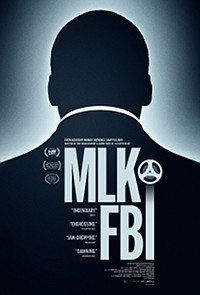 dir Sam Pollard prd Benjamin Hedin scr Benjamin Hedin, Laura Tomaselli with Martin Luther King, J Edgar Hoover, James Comey, Andrew Young, Clarence Jones, David Garrow, Beverly Gage, Charles Knox, Donna Murch, Marc Perrusquia release US/UK 15.Jan.21 20/US 1h44 Now streaming... |
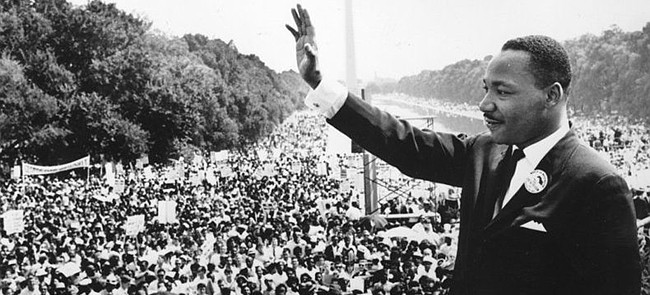 Recently declassified documents provide the basis for this documentary, which traces a shocking sustained attack by the US government on a single citizen. Insulted, beaten and jailed, Martin Luther King was ruthlessly targeted by the FBI simply for insisting that America should be as free and equal as it claimed to be. The film is a bit dry and insistent, but the material has huge historical significance. From 1955 to 1968, King changed the face of American society with his nonviolent revolution. The film opens on the 1963 march on Washington and his indelible I Have a Dream speech, which triggered J Edgar Hoover's racist fear of a "Black messiah" promoting equality. Hoover conflated this with Soviet-style communism, an idea that continues to persist in America. Within weeks he mobilised the FBI to destroy King, digging into his private life to expose details they hoped would undermine his authority. And this relentless invasion of privacy continued until King's death. The film is narrated using interview material from experts and people who were there at the time. This amplifies the skilful mix of archive footage, clips from iconic movies and newsreels, and graphics revealing the official documents. It's a deep dive into Hoover's his deep-seated bigotries. So as he follows King, he only gets angrier when King's devout Christian nonviolent beliefs come out against the Vietnam War, which also causes problems with King's political friends. And when he started reaching out to mobilise the poor, Hoover says he has to be stopped. The film also explores how Hoover won over the opinion of the American people, successfully painting King as an untrustworthy villain, even if the leaks about King's sex life never gained traction. So he was incensed when King won the Nobel Prize, and he doubled down on gathering evidence of King's womanising, fuelled by racist views about Black sexuality. It's an unspoken irony that Hoover believed King was morally unfit to be a leader. Of course, King wasn't the only Black leader the FBI investigated, as their entire policy was based on racial prejudice. And these declassified files show how they used informants and planted lies to tear organisations apart. And ultimately, the filmmakers point to the fact that Hoover pushed his agents to find specific evidence, and whether the agents' reports are accurate can never be verified. And of course this kind of racially fuelled aggression still says a lot about the white establishment and its fear of reckoning with its own violent past.
| ||||
|
Zappa Review by Rich Cline | 
| |||||
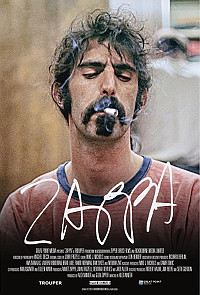 dir-scr Alex Winter prd Alex Winter, Glen Zipper with Frank Zappa, Alice Cooper, Gail Zappa, Pamela Des Barres, Steve Vai, Bunk Gardner, Ruth Underwood, Ian Underwood, Scott Thunes, Mike Keneally, Ray White, David Harrington, Bruce Bickford release US 27.Nov.20 20/US 2h08 Now streaming... |
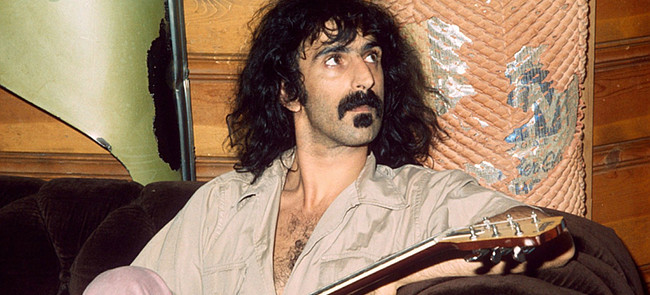 Filmmaker Alex Winter was given access to Frank Zappa's extensive personal archive, and mined it to tell his story with never-seen audio and video recordings, home movies and snapshots. This footage allows Zappa to narrate his own story, often sharing anecdotes while he's doing something else. This infuses the film with his dry wit, and makes it fascinating to watch for fans of Zappa and anyone interested in music history. Growing up in rural Southern California, Frank was obsessed with classical R&B and taught himself to play blues guitar. As a teen in the mid-50s, his first band was seen as a threat to the community because it was multi-racial. In the 1960s, his songs with the Mothers of Invention offered commentary on current issues while Frank became known for his complex music and raucous partying. But Frank disapproved of drugs. He also fell in love with Gail at first sight, and they were married for 25 years until his death from cancer at 52. A great storyteller, Zappa has terrific tales to tell. Everything is connected to the early lessons he learned about injustice in small towns, where anyone who's different is treated with suspicion, or worse. Zappa rejected commercial pressures, taking a resolutely artistic approach to music. Ignored by more conforming California audiences, he found fame in New York and Europe. But he remained critical of the music business' stranglehold on creativity. And he terrified the establishment simply by being himself. Winter's fluid assembly recounts the story chronologically, cleverly editing film clips, artistic flourishes, clay animation, performance sequences and candid interviews. Zappa's collaborators speak of his genius and perfectionism, as well as his inability to express himself or show emotion. Oddly, none of his children speak to the cameras, which limits the film to his work. There isn't a dull shot here, even if the running time could have been tightened in the second half, as themes begin to feel repetitive. But then, Zappa fought these same battles throughout his career. The central idea is that, because he refused to play accepted styles of music and write hits, Zappa was considered dangerous. And he knew that the businessmen wanted him out of the way, especially in the 1980s when the industry became more about how you looked than whether your music was good. So musicians loved him, and his work inspired artists from the Beatles to Kronos Quartet. His outspoken approach to the business may not have made a difference, but his music continues to change the world.
| ||||

See also: SHADOWS FILM FESTIVAL © 2021 by Rich Cline, Shadows
on the Wall
HOME | REVIEWS | NEWS | FESTIVAL | AWARDS
| Q&A | ABOUT | TALKBACK | | ||||

